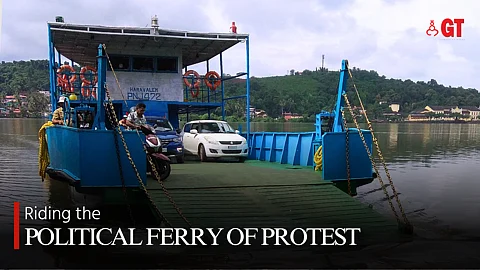

The newest government decision to draw censure from the opposition and
protest from the people – or rather a section of the people – is the
move to charge two-wheeler users of the ferry to cross the rivers in
Goa and increase the rate for four-wheelers.
Currently, and for the last many years, two-wheelers have been
utilising the ferry services for free. The decision of the government
to charge them hence came as a surprise, but should it have drawn
opposition? That’s a question that requires some discussion,
especially in the wake of the government possibly cancelling the
decision
If one goes by the principle of paying for a service being utilised,
the government decision appears to be fair. To make it easier for
regular users and not burden them further, it has even decided to
introduce a pass system for residents of the islands who use the ferry
for daily commutes, whereby they will pay a concessional rate, while
visitors who do not use it frequently will pay the full amount on a
per-ride basis.
This again appears to be fair. What then is the reason for the
opposition? Is it that the users of the ferry have got accustomed to
crossing the rivers of Goa for free and so now are reluctant to pay
for the service?
It is not as if the ferry service has always been free. As pointed out by the River Navigation Minister, regular two-wheeler users of the ferry who opt for a pass would be paying exactly what they paid in 1995 for each ferry ride.
It is not as if the ferry service has always been free. As pointed out
by the River Navigation Minister, regular two-wheeler users of the
ferry who opt for a pass would be paying exactly what they paid in
1995 for each ferry ride, when the then government, in a populist
measure, had stopped charging two-wheelers for using the ferry. If
they make more than a trip a day, then the amount is half of what they
were paying almost three decades ago.
It may be pertinent to note that the minister at the time when the
decision to stop charging two-wheelers for using the ferry represented
a constituency that had two major riverine islands and continued
winning from that constituency for several years. So, now the
question, was the 1995 decision to make ferry services free for
two-wheelers a fair one?
Nothing, however, is free, and if the users of the ferry are not
paying a fee it is because the service is subsidised by the taxpayers,
many of whom possibly never use the ferry. Why then should the
taxpayer be burdened for a service that they are not using but
somebody else is and is reluctant to pay for it?
Perhaps the opposition parties that appear to have joined hands with the protestors in this and the media houses that are fuelling the protests, should tell the people what are the reasons for opposing the move.
Perhaps the opposition parties that appear to have joined hands with
the protestors in this and the media houses that are fuelling the
protests, should tell the people what are the reasons for opposing the
move. It does appear to be political posturing and nothing beyond
that.
The opposition that has stood alongside the protesting villagers
should stop playing politics and instead view the decision on a more
pragmatic level. What exactly is wrong with it? Can the opposition
justify the free rides? Weren’t even passengers once paying for the
use of the ferry service? For that matter, before the bridge on the
River Zuari connecting Agassaim with Cortalim, weren’t bus passengers
made to pay to ride the ferry to the other side?
The opposition, right now, has not come from one particular island but
from many. But let’s look at it in a different manner. Take for
instance the island of Divar, which is just a few kilometres from
Panjim and attracts a huge number of tourists who ride on rent-a-bikes
to the island and crisscross the river free of charge on a daily
basis. The ferry ride is free for residents, why shouldn’t the
tourists pay for riding the ferry?
A move to benefit residents has given tourists an opportunity for a
free ride. In fact, the free ferry rides in Goa are even written about
on blogs by travel writers and on portals promoting tourism. So it's
an added attraction in Goa. And who is paying for it? The taxpayer.
It is also erroneous to say that the government has failed to create
infrastructure in terms of bridge connectivity to these islands, as
there are some islanders who have consistently opposed bridges. Is it
right to oppose bridges and also oppose paying for the ferry ride or a
higher fare? Before deciding to revoke the decision, the government
should consider what will be achieved by going back on it.